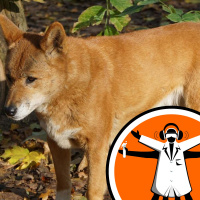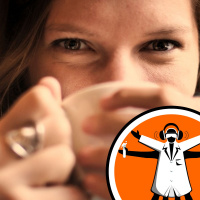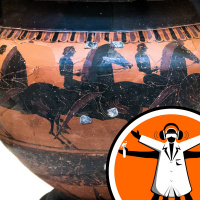Naked Scientists Special Editions Podcast
- Autor: Vários
- Narrador: Vários
- Editora: Podcast
- Duração: 168:36:14
- Mais informações
Informações:
Sinopse
Probing the weird, wacky and spectacular, the Naked Scientists Special Editions are special one-off scientific reports, investigations and interviews on cutting-edge topics by the Naked Scientists team.
Episódios
-
Dog and Dingo DNA sequences
29/04/2022 Duração: 06minDingoes are native Australian dogs, although how and when they got to Australia isn't known. They were certainly already there by the time the first western explorers visited the continent, but fossil dingo remains go back only a few thousand years. So what is the relationship between dogs and dingoes, and the wolves they're both related to? Speaking with Chris Smith, Latrobe University's Bill Ballard got into this debate under slightly unusual circumstances... Like this podcast? Please help us by supporting the Naked Scientists
-
Coffee without the coffee beans
28/04/2022 Duração: 04minCoffee prices are on the rise and the plant is said to decline by 60% before 2050, meaning new coffee alternatives are being considered in order to give us that caffeine hit. Harry Lewis speaks to Charlie Shaw from Atomo coffee to find out how they've been making our favourite beverage, without the use of coffee beans... Like this podcast? Please help us by supporting the Naked Scientists
-
Recreating smells from the past
07/04/2022 Duração: 05minIf I asked you to give up one of your five senses, which one would you choose? Chances are, instead of giving up your ability to see or hear, your sense of smell would be in pole position for the chop. Scientists in Germany think we're under appreciative of smell in our evolution as a species, with new research from the Max Planck Institute exploring biomolecular methods to bring smells from the past back to life. James Tytko spoke with Barbara Huber... Like this podcast? Please help us by supporting the Naked Scientists
-
A new method for recycling plastics
04/04/2022 Duração: 04minThe world has a huge problem with plastics. While they are a materials scientist's dream in terms of their properties, they are an environmentalist's worst nightmare, because they don't break down naturally and are very hard to recycle. But Athina Anastasaki, from ETH Zurich, has set herself the goal of making plastics that can be recycled more easily and now she thinks getting close. Chris Smith found out more... Like this podcast? Please help us by supporting the Naked Scientists
-
Data storage in DNA
24/03/2022 Duração: 04minResearchers have been studying DNA as a method to store binary data. As data generation continues to increase in the information age, we need new methods to store it. DNA is extremely robust and can store data 100 times more densely compared to a computer hard drive. In order to capitalise on DNA as a data storage platform, modifications to the molecules that make up DNA are currently being studied. Like this podcast? Please help us by supporting the Naked Scientists
-
Solving puzzles to help cancer research
23/03/2022 Duração: 05minPlaying games may be something you do in your spare time or in the queue at the supermarket, but striving for that elusive high score can also now contribute to science! Julia Ravey grabbed her mobile and caught up with Marc Marti-Renom; he's part of a team at the Centre for Genomic Regulation in Barcelona, where they've built a game for your phone that will help contribute to cancer research... Like this podcast? Please help us by supporting the Naked Scientists
-
Pig grunts indicate their emotions
17/03/2022 Duração: 04minThere are over 7,000 documented languages in the world to date, and now we might have another to add to the list: the one spoken by pigs. No, this is not an April Fool come early. Elodie Mandel-Briefer, from the University of Copenhagen, has assembled a vast dataset of pig noises. And by correlating the noises the animals produced in response to positive or negative experiences, she can pin emotions on sounds. Julia Ravey got in touch to find out if the research team responsible are completely off their trotters... Like this podcast? Please help us by supporting the Naked Scientists
-
Indoor pollution from cleaning
11/03/2022 Duração: 04minResearchers from Indiana University studied the reactions of volatile compounds released when cleaning with ozone in the air. They found the reactions led to formation of nanoparticles classified as indoor pollutants. Evelyna Wang speaks to Phillip Stevens about this discovery... Like this podcast? Please help us by supporting the Naked Scientists
-
The Dangers of Nuclear Weapons
10/03/2022 Duração: 03minNuclear weapons are at the forefront of news but what are they and how do they work? Anoushka Handa reports... Like this podcast? Please help us by supporting the Naked Scientists
-
Creating Oxygen on the Moon
02/03/2022 Duração: 04minAs NASA aims to send humans back to the moon in the upcoming years, research on how to supply oxygen to future settlements on the moon are underway. Oxygen can be genearted from lunar resources such as ice. A team of researchers including Mark Symes, from the University of Glasgow and the European Space Agency, have been studying the effects of low gravity environments on oxygen production... Like this podcast? Please help us by supporting the Naked Scientists
-
Roman faeces housing fossilised parasites
01/03/2022 Duração: 02minWashing our hands has become paramount during the pandemic, but the Romans didn't seem to bestow any importance to this, leading to parasites and infections. Anoushka Handa spoke to Sophie Rabinow, to tell us more... Like this podcast? Please help us by supporting the Naked Scientists
-
Blood clot tests with smartphones
28/02/2022 Duração: 04minBlood clotting is important in preventing excessive bleeding, but for millions of people, it can also mean increased risk of mortality due to certain medical conditions. Blood thinning medication is required for those suffering theses conditions as well as constant blood clot monitoring. A team from the University of Washington, including Justin Chan, has developed a method to take blood clot tests at home, using only a smartphone and a small drop of blood... Like this podcast? Please help us by supporting the Naked Scientists
-
Shades of Blue Stop a Mosquito Biting You
25/02/2022 Duração: 05minHave you ever got a horrible mosquito bite whilst on holiday and wondered 'why me again?' And was your travel buddy someone who never got one? It could very well be to do with their fashion sense. Anoushka Handa spoke to Jeff Riffell to find out more... Like this podcast? Please help us by supporting the Naked Scientists
-
Magnetic Fields Guide Migratory Birds
23/02/2022 Duração: 03minThere's a growing body of evidence that birds can detect magnetic fields like the one around the Earth, possibly by "seeing" them. And this, researchers think, accounts for how migrating birds, like reed warblers, manage to find their way, seemingly unerringly, half way around the planet. But it's more subtle than just using the magnetic field like a compass. What Oxford University's Joe Wynn thinks is happening is that the birds are pre-programmed by their upbringing to fly in a certain direction, but they use the angle - or inclination - of the Earth's field, to work out how far north or... Like this podcast? Please help us by supporting the Naked Scientists
-
Car Dependence in Greenfield Housing
17/02/2022 Duração: 05minGreenfield housing developments are residential communities built upon land which was not previously occupied by anything else. These modern homes are often very energy efficient, but a new report by Transport for New Homes has found that these developments are offsetting their positive contribution to reducing greenhouse gas emissions because of a lack of planning around sustainable modes of transport. James Tytko went to see for himself... Like this podcast? Please help us by supporting the Naked Scientists
-
Why don't plants freeze to death in Winter?
14/02/2022 Duração: 04minKrzysztof wrote in to ask 'Why don't plants freeze to death during Winter?' and James Tytko tracked down Professor Howard Griffiths, from the University of Cambridge, to break the ice on this question. Like this podcast? Please help us by supporting the Naked Scientists
-
Black hole seen forming new stars
09/02/2022 Duração: 03minBlack holes are known for their awesome destructive powers, ripping stars apart piece by piece. But now, scientists have seen evidence of a black hole helping to form stars. Using the Hubble Telescope, researchers at Montana State University have seen a massive black hole at the centre of a small galaxy called Henize 2-10 triggering star formation around it. Robert Spencer spoke to Zachary Schutte to find out more... Like this podcast? Please help us by supporting the Naked Scientists
-
Trees for the Jubilee
06/02/2022 Duração: 23minPlanting trees has a great impact on creating a greener environment. The Queen's Green Canopy is an initiative to encourage people to plant a tree in honour of the Her Majesty's Platinum Jubilee. Robert Spencer and Anoushka Handa take a dive into the science of trees to find out more about these fantastic plants and to discover what they can do around Cambridge to help... Like this podcast? Please help us by supporting the Naked Scientists
-
Game of Life still revealing secrets
03/02/2022 Duração: 04minMathematicians Ville Salo and Ilkke Toermae from Finland have solved a long-standing problem in the field of cellular automata (The Game of Life). Despite being quite simple systems to describe, these automata often show quite complex behaviour. Now, though, we are starting to find out more about situations when these systems aren't quite so dynamic. Robert Spencer has more... Like this podcast? Please help us by supporting the Naked Scientists
-
Organising our memories
02/02/2022 Duração: 04minMemories form a large part of human interaction. Scents, tastes and touch all can invoke us to remember particular events. But how do we know the order of these events? How do you remember that this time last week you were listening to our show... or at least we hope so! New research has shown that the human brain contains time cells to understand when an event has occurred. Anoushka spoke with Dr. Leila Reddy from the French National Center for Scientific Research... Like this podcast? Please help us by supporting the Naked Scientists

































